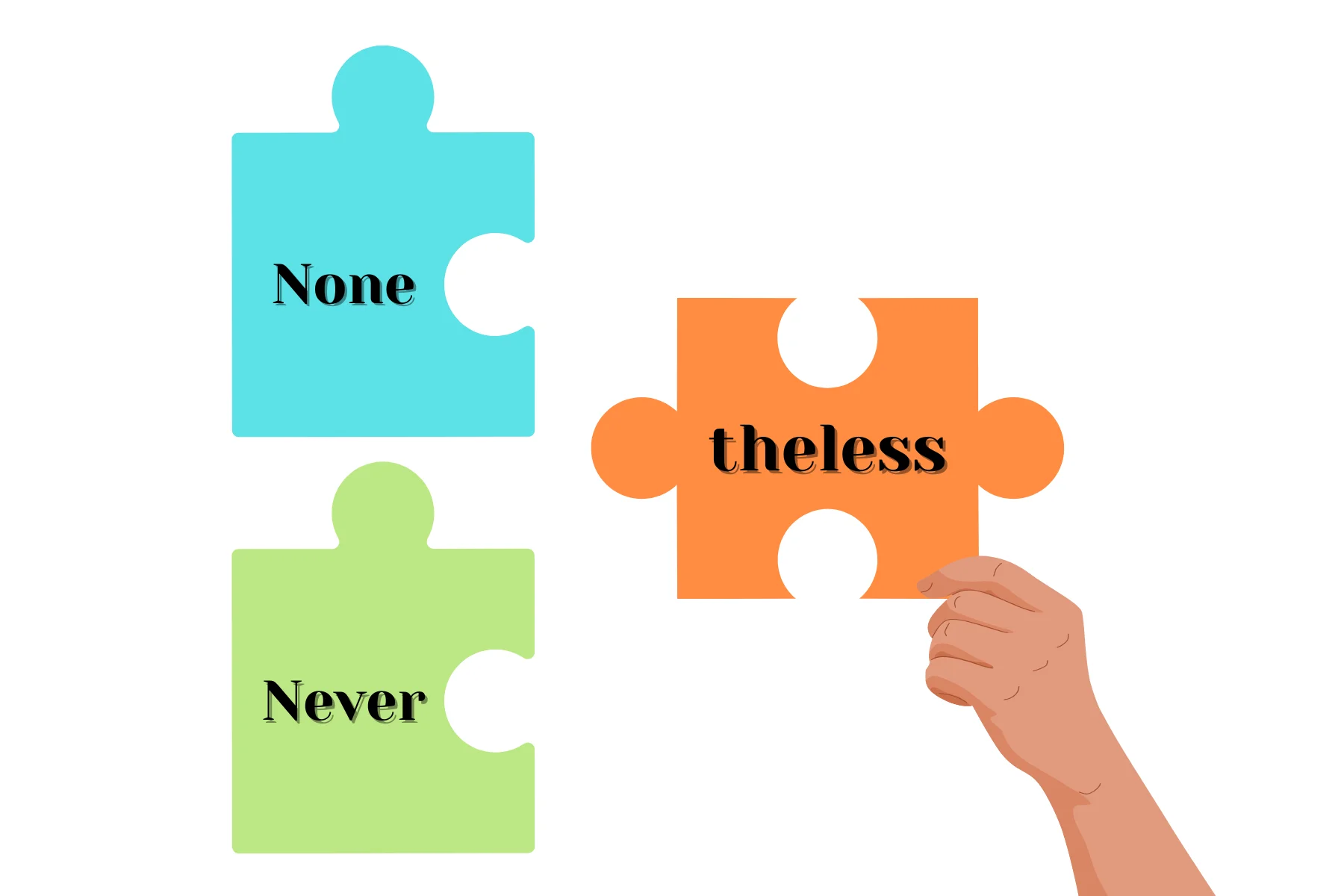Understanding the Difference Between "Nonetheless" vs "Nevertheless"

English is rich with terms that seem interchangeable but possess subtle nuances that can
change the tone and clarity of a sentence. Understanding the differences between adverbs
like 'nonetheless' and 'nevertheless' not only refines your writing skills but also enhances
your precision in language use.
This grasp of nuanced language is crucial for articulating clear arguments in
academic papers and delivering effective communication in professional
settings, making your message more impactful and understood.
Definitions and Origins
What Does "Nonetheless" Mean?
"Nonetheless" is an adverb that suggests that despite everything, the statement following it
remains true. Evolved from the phrase "none the less", it is used to introduce a surprising
or less expected outcome.
For instance, "The odds were not in his favour; nonetheless, he won the match."
What Does "Nevertheless" Mean?
"Nevertheless" means "in spite of that" and is used to continue an argument despite the
preceding contrasting information. Originating from "never the less," it typically
introduces a more anticipated continuation.
An example is, "He is not the best player on the team; nevertheless, he is often a key
player in crucial games."
Usage and Context
Using "Nonetheless" in Sentences
"Nonetheless" is particularly effective in situations where the outcome is less expected, highlighting a contrast that emphasises resilience or an unexpected positive turn:
- Despite Doubts: "His previous ventures had failed. Nonetheless, he was optimistic about his new business."
- Contrary to Expectations: "The weather forecast predicted rain; nonetheless, the day was sunny and clear."
- Overcoming Difficulties: "She had minimal resources at her disposal but nonetheless, managed to organise a successful event."
Using "Nevertheless" in Sentences
"Nevertheless" is used to convey continuation in a logical, often anticipated manner, typically in more formal or structured arguments where an acknowledgment of the preceding point is crucial:
- Acknowledging Challenges: "The project timeline was tight but nevertheless, the team managed to deliver on schedule."
- Despite Problems: "There were minor technical issues during the performance. Nevertheless, the audience enjoyed the show."
- Holding to Principles: "The negotiations were becoming increasingly difficult; nevertheless, she remained firm on her key demands."
Synonyms and Variants
To diversify your writing and adjust the nuance of your text, you can utilise several synonyms for "nonetheless" and "nevertheless." Each alternative offers a different emphasis, which can subtly change the reader’s perception of the text.
However
"However" is a versatile connector used to introduce a statement that contrasts with what
has been said previously. It can be used in both formal and informal contexts.
Meeting Challenges: "The project was challenging. However, the team managed
to meet the deadline."
Despite this
"Despite this" emphasises continuity in spite of contrary evidence or thoughts presented
before. It is particularly useful when you want to highlight persistence or resistance.
Decision Against Odds: "The data was not entirely favourable. Despite this,
the committee decided to proceed with the plan."
Even so
"Even so" is used to introduce a statement that acknowledges the preceding points and still
suggests a different outcome. It is often used to introduce a conclusion that might not
logically follow from the previous arguments but is true nonetheless.
Exceeding Expectations: "He had very little time to prepare; even so, his
presentation was the best of the day."
On the other hand
"On the other hand" is used to present a contrasting idea or perspective in a situation
where two opposing viewpoints are being considered. It is less about contradiction and more
about presenting an alternative.
Weighing Risks and Rewards: "The strategy seems risky. On the other hand,
it offers the potential for high rewards."
Yet
"Yet" is a concise way to introduce a contrasting idea that follows logically from the
previous statement. It often carries a sense of expectation or surprise.
Unexpected Victory: "The team was not favoured to win; yet, they pulled off
an upset."
Using these synonyms allows you to tailor your language to the context and tone of your
communication, making your writing more engaging and precise. Each option serves a slightly
different function, enabling you to express contrast with the right level of emphasis and
formality.
Conclusion
Learning to use words like "nonetheless" and "nevertheless" really improves your ability to communicate clearly and effectively. At Creative Campus, we focus on teaching these important skills as part of our English enrichment program. This helps our students do well not only in school, but also in everyday life, preparing them for all sorts of future challenges. Our approach makes sure that students aren't just learning for now—they're mastering skills that will benefit them for a lifetime.
English and Future Success
Research shows that strong English skills go far beyond the classroom, playing a key role in
university1 and career success2. Better English proficiency is not just about grammar and
vocabulary; it provides a crucial stepping stone for achieving life goals.
At Creative Campus, we believe that nurturing strong English skills lays the groundwork for your child’s future success. Our rigorously developed in-house curriculum not only seeks to enhance language proficiency but also fosters critical thinking, creativity, and confidence. Through engaging lessons and dedicated guidance, we equip students with the tools they need to excel academically and beyond. Ready to unlock your child’s full potential? Contact us today to book a trial class and see how we can make a difference!

About Ms Geraldine Chew

DIRECTOR OF PROGRAMMES (SECONDARY AND GENERAL PAPER)
CHIEF EXECUTIVE OFFICER
DIRECTOR OF TEACHER INSTRUCTION
